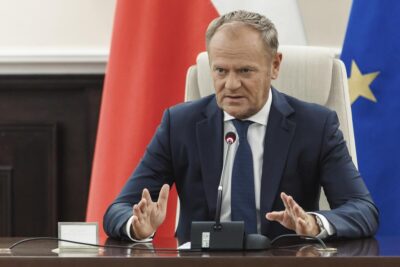
Andrei, a 29-year-old computer programmer who fled to Germany from Belarus two years ago amid a harsh crackdown on political dissent, is facing a serious dilemma.
His Belarusian passport has expired, along with his German residence permit. But Belarus has stopped renewing passports at its embassies abroad under a new decree by authoritarian leader Alexander Lukashenko.
“I have a terrible choice to make: become an illegal immigrant in Germany, or return to Belarus, where I will probably be arrested,” said Andrei, who asked to be identified only by his first name because he fears for his safety.
Authorities in Minsk, he told The Associated Press, “managed to turn the life of Belarusians into hell even here.”’
An estimated 500,000 Belarusians fled to the West after Lukashenko was declared the winner of the 2020 election, which was widely seen as fraudulent. Many of them face having no valid documents after the Sept. 4 decree halted passport renewals.
Lithuania and Poland, which host the largest number of Belarusians, are trying a temporary fix by issuing them a one-year “foreigner’s passport” that verifies their identity and gives them the right to travel. At least 24 such documents have been issued by Lithuania’s Migration Department.
Poland’s Foreign Ministry said it expects “further repression” in Belarus and wants to put the issue on the European Union’s agenda, but it’s unclear when that will happen.
In Estonia, Janek Mägi of the Interior Ministry said that Belarusians or other foreigners who cannot renew their documents in their home country are dealt with on a case-by-case basis.
Anitta Hipper, a spokesperson for home affairs for the European Commission, said those who can’t get a passport from their country of origin should seek support from the one where they reside. She added the EC welcomed Lithuania’s temporary solution and said it was monitoring the overall situation.
Germany, where Andrei lives, deals with immigrants’ cases individually.
Germany’s Interior Ministry said if a foreign national’s passport has expired, authorities can examine if it’s “reasonable” for the person to get a new passport from their home country or whether Germany can issue replacement papers. The person must state why getting a new passport from their country would not be a reasonable expectation and must have residence status in Germany to get replacement papers.
Andrei needs an immediate solution because he’s lost his job and can’t get a new one without a residence permit. To apply for refugee status, his lawyers say he needs documents from Belarus to prove he was persecuted in the country, where he said he was arrested and beaten during the 2020 protests.
“This is the authorities’ revenge against all Belarusians who fought for democracy and opposed Lukashenko’s policies,” he said, noting his brother was sentenced to seven years in jail.
Analysts believe Lukashenko wants to neutralize a significant part of the opposition in the country of 9.5 million ahead of parliamentary elections in 2024 and a presidential election in 2025.
“The authorities are making it clear they do not want opposition citizens in any form and are doing everything to prevent them from participating in the elections,” said independent Belarusian analyst Valery Karbalevich.
Lukashenko, he added, wants to avoid another uprising like in 2020, when months of anti-government protests saw more than 35,000 people detained, with many saying they were tortured. About 1,500 people remain imprisoned on politically motivated charges, including Nobel Peace Prize laureate Ales Bialiatski.
Lukashenko has not commented publicly on the passport decree.
Oleg Gaidukevich, deputy head of the parliament’s Commission for International Affairs, said “only extremists are afraid to return to Belarus.” The decree “deals a final blow to the fifth column within the country,” he added.
“Those who escaped have long been working for other countries — for Poland, Lithuania, the United States — so get passports from these countries and stay there,” he told Belarusian state television.
Sviatlana Tsikhanouskaya, who challenged Lukashenko in the election and has since become the leader-in-exile of the opposition, said no Belarusians should return home under these circumstances.
“Not a single document in the world is worth human freedom,” said Tsikhanouskaya, whose activist husband Siarhei Tsikhanouski is serving a 19 1/2-year sentence for organizing protests.
She said the opposition has developed a “Passport of New Belarus,” which can serve as confirmation of citizenship and could be used as a travel document for Belarusians abroad.




